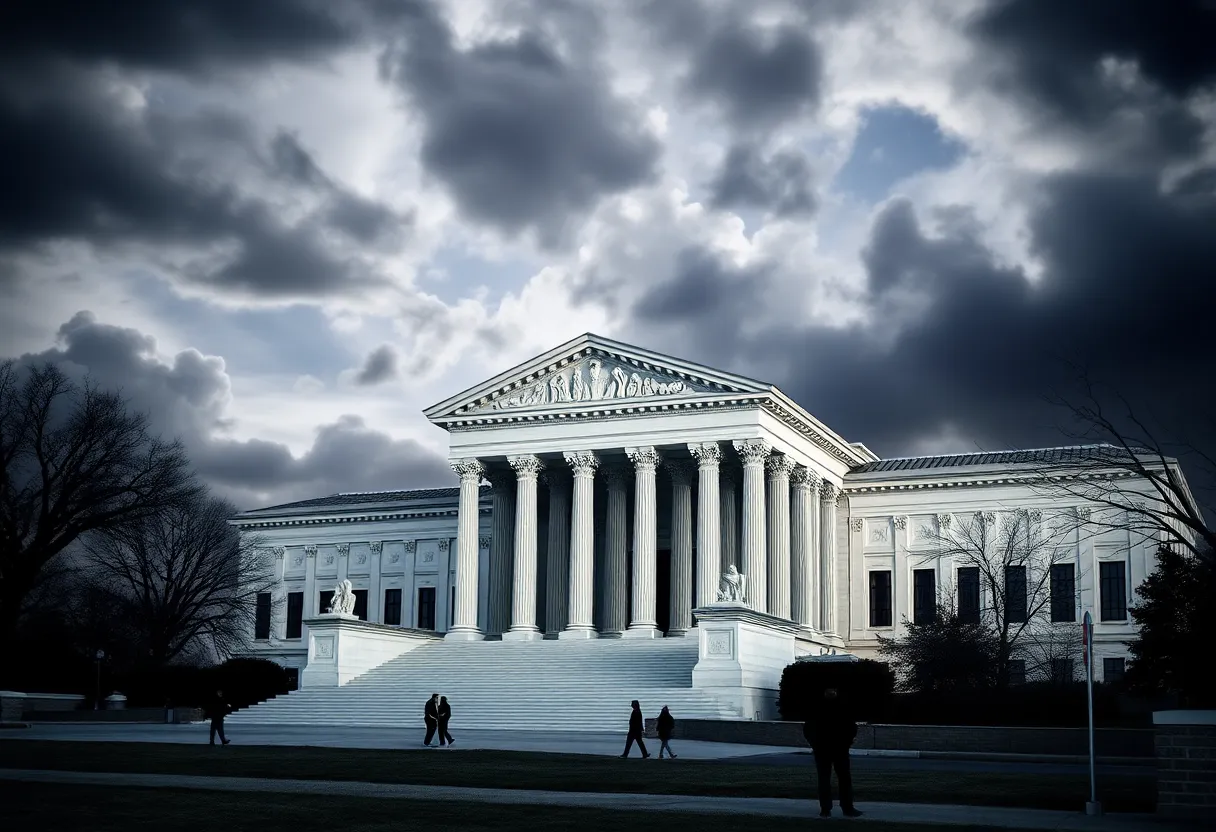News Summary
The Supreme Court has permitted the Trump administration to resume deportations of immigrants to countries they do not hold citizenship in, which may not be safe. This ruling halts prior court decisions that offered a ‘meaningful opportunity’ for migrants to contest their deportations. Legal advocates express concerns about the repercussions for due process and the risks faced by migrants returned to conflict zones. Dissenting opinions from justices highlight the potential dangers these individuals face, raising alarms about the long-term effects on immigration policy and the treatment of vulnerable communities.
Supreme Court Greenlights Controversial Deportations
In a decision that has stirred up a lot of conversation, the Supreme Court has allowed the Trump administration to resume deportations of immigrants to countries where they don’t hold citizenship, even if these regions are far from safe. This ruling has temporarily put the brakes on a lower court decision that had previously stated migrants should have a “meaningful opportunity” to contest their deportations. Talk about shaking things up!
What Does This Ruling Mean?
This legal move is seen as part of the court’s “emergency docket,” which enables quicker decisions without going through the full oral arguments and explanations process. It’s like a fast pass for legal rulings! It boosts the Trump administration’s ongoing efforts to crack down on immigration policies, targeting individuals who may have criminal records in the U.S.
Many of these deportations are aimed at sending immigrants back to conflict-ridden countries like South Sudan. Can you imagine being sent back to a place like that? A lawsuit was filed in Boston by four individuals on behalf of all immigrants who could be affected by these deportations, raising concerns about their safety and well-being.
Initial Block and Controversy
A U.S. District Judge, Brian E. Murphy, initially ruled against the Trump administration, placing a temporary halt on these deportations. He even accused the administration of ignoring his order during a planned deportation flight to South Sudan! Talk about a legal face-off!
Reports have surfaced about the conditions faced by migrants who are kept under detention, specifically in a U.S. naval base in Djibouti. They reportedly have to endure poor conditions that come with health hazards and exposure to threats like rocket attacks. It raises some serious questions about the treatment of these vulnerable individuals.
Dissenting Voices
The dissenting opinions from Justices Sonia Sotomayor, Elena Kagan, and Ketanji Brown Jackson have added fuel to the fire. They expressed grave concerns about what they feel is the court enabling “lawlessness” by the administration. Sotomayor pointed out that many migrants face real risks of violence and persecution when deported to unsafe countries. It’s not just a legal technicality; it’s a matter of lives at stake.
Concerns Over Due Process
Legal advocates are sounding alarms about how the ruling might strip away important due process protections that previously helped migrants contest their deportations. Previous lower court orders had instructed the administration to provide proper notices and opportunities for immigrants to defend themselves based on risks of torture and persecution. The fear now is that this significant win for the administration might mean a more reckless approach to immigration policy.
The Debate Continues
Solicitor General D. John Sauer has argued that past judicial procedures were hindering the authority of the executive branch when it comes to immigration policy. Supporters of the ruling say it’s a necessary approach to tackle what they refer to as a crisis of illegal immigration, focusing on what they call “the worst of the worst” illegal aliens.
Yet, critics, including law professors, are cautioning that this ruling could embolden the administration to disregard judicial orders in other immigration matters. As this story continues to unfold, one thing is for sure: the conversation around immigration, due process, and the challenges faced by vulnerable communities remains more relevant than ever.
As the nation grapples with these complex issues, it’s clear that this decision will have lasting impacts. It’s essential to stay informed and engaged as the legal and social ramifications continue to emerge.
Deeper Dive: News & Info About This Topic
- Washington Post: Supreme Court Greenlights Controversial Deportations
- Wikipedia: Supreme Court of the United States
- NBC News: Supreme Court Allows Trump to Deport Immigrants
- Google Search: Supreme Court Deportations
- CBS News: Supreme Court Lifts Order on Deportations
- Google Scholar: Supreme Court Deportation Policy
- ABC News: Supreme Court Resumes 3rd Country Removals
- Encyclopedia Britannica: Immigration Policy
- Los Angeles Times: Supreme Court Sides with Trump on Deportations
- Google News: Trump Deportation Supreme Court

Author: STAFF HERE PETERSBURG WRITER
The ST PETERSBURG STAFF WRITER represents the experienced team at HEREStPetersburg.com, your go-to source for actionable local news and information in St Petersburg, Pinellas County, and beyond. Specializing in "news you can use," we cover essential topics like product reviews for personal and business needs, local business directories, politics, real estate trends, neighborhood insights, and state news affecting the area—with deep expertise drawn from years of dedicated reporting and strong community input, including local press releases and business updates. We deliver top reporting on high-value events such as Grand Prix of St. Petersburg, Localtopia, and SHINE Mural Festival. Our coverage extends to key organizations like the St. Petersburg Area Chamber of Commerce and St. Pete Downtown Partnership, plus leading businesses in finance, manufacturing, and healthcare that power the local economy such as Raymond James Financial, Jabil, and Bayfront Health St. Petersburg. As part of the broader HERE network, including HEREJacksonville.com, HEREOrlando.com, HERETallahassee.com, and HERETampa.com, we provide comprehensive, credible insights into Florida's dynamic landscape.



